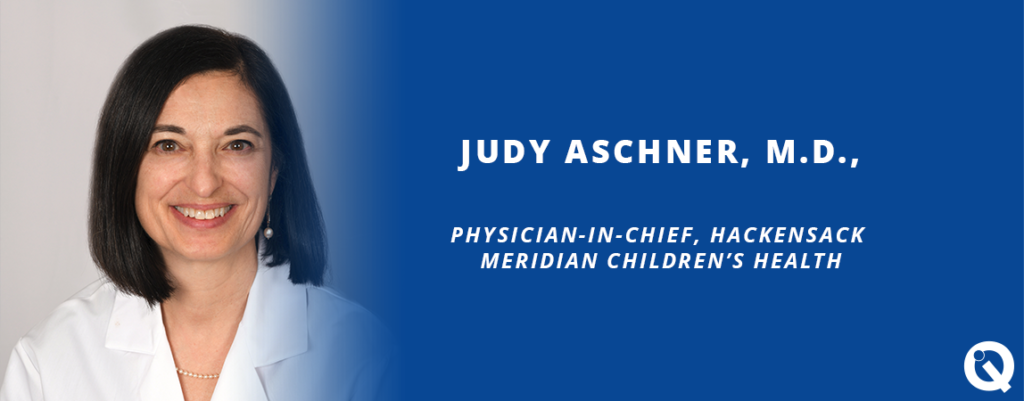Judy Aschner, M.D., is Physician-in-Chief at Hackensack Meridian Children’s Health, which is made up of two hospitals — the Joseph M Sanzari Children’s Hospital at Hackensack University Medical Center and the K. Hovnanian Children’s Hospital at Jersey Shore University Hospital. HealthySteps is a member of the Quality Institute’s Provider Council.
Tell us about the HealthySteps program.
HealthySteps is an evidence-based program of ZERO TO THREE, the nation’s leading nonprofit working to ensure all babies and toddlers have a strong start in life. HealthySteps is an interdisciplinary pediatric primary care model that integrates primary care pediatricians with behavioral health specialists, such as clinical social workers or Ph.D. psychologists. The goal of HealthySteps is to focus on that very critical period from zero to three by promoting positive parenting and healthy development for babies and toddlers. The emphasis is on families living in low-income communities, those with limited resources, or those with life circumstances that add to the challenges of bringing up young children. The program broadens the primary care team and offers a more comprehensive support system for families.
How does HealthySteps change the way families receive care from their pediatrician?
We screen all children from birth to age three to identify families that have additional needs, even those who on the surface are doing well. We are there to talk about common challenges like breast feeding, sleep behaviors, and adapting to life with a new baby or young child. For those families with more challenges, the HealthySteps specialist can connect families to resources to assist them with mental health problems, including maternal depression, domestic violence, housing issues, transportation challenges, and food scarcity.
There’s more time for families to discuss what’s on their mind beyond the basic pediatric visit that focuses on physical health and growth. Pediatricians have different training and skills than a social worker or Ph.D. psychologist. For the families that have been identified as having more challenges than typical, the office visit is done with the HealthySteps specialist and the pediatrician together with the family.
How did the HealthySteps program come to New Jersey?
New Jersey has not had HealthySteps practices until this Hackensack Meridian Children’s Health program was funded. But HealthySteps practices exist in many states across the United States. I worked in the Bronx at the Children’s Hospital at Montefiore, and all the primary care pediatric practices there have HealthySteps specialists embedded in the practices. I saw how impactful it could be for families and I wanted to bring this to New Jersey. The Nicholson Foundation, the Burke Foundation and the Turrell Fund collaboratively fund this pilot project, with significant support from Hackensack Meridian Children’s Health.
We established three HealthySteps practices: one in Hackensack and two in Neptune. They all serve primarily, though not exclusively, lower income families, and those with language barriers. We have outcomes that we’re hoping to improve and to demonstrate more evidence in support of this model of interprofessional care to improve attendance for well-child visits, increase vaccination rates, reduce childhood overweight and obesity, and achieve earlier access to dental care. We work to extend the length of time that mothers breastfeed. We’re trying to reduce inappropriate emergency department use. We’re doing screening and referrals for postpartum and maternal depression and trying to enhance literacy practices by reminding parents of the importance of reading, even for babies. We promote positive strategies for behavioral problems. All our social workers have extensive experience working with young children.
Can the program be sustained and spread throughout New Jersey?
We’re working with payers, including Medicaid, to find ways to sustain this model and spread it throughout New Jersey. Payers see the benefits of having healthier children, getting children vaccinated, and reducing emergency department use. Right now, private pediatric practices cannot bill for the services of social workers.
Finally, we like to ask a question outside the scope of your professional life. Where might we find you when you are not working?
Well, I do work every day. But outside of work that’s an easy question. I’ll be doing one of two things: visiting my children and grandchildren; and several times a week you’ll find me at the rock-climbing gym. I find rock climbing physically and intellectually challenging. I’m surprised by how much I love it.

